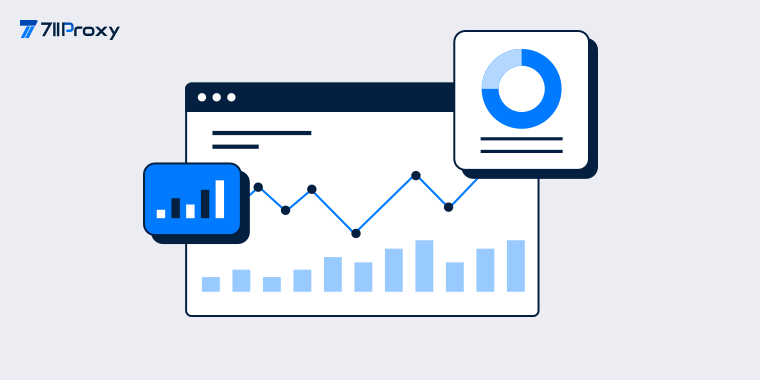Back to Blog
Application of Proxy IP in Market Research
11/11/2024

In the field of market research, obtaining accurate data is a crucial task, and proxy IP has gradually become an indispensable tool for conducting efficient research. Proxy IPs not only effectively deal with network access limitations, but also help researchers to collect data from different geographical locations. In this article, we will discuss the key application scenarios and advantages of proxy IP in market research, providing market researchers, data analysts and others with insights on how to efficiently utilize proxy IP to acquire in-depth market data.
1. Coping with Geographic Restrictions
In the context of globalization, market research usually needs to cross borders to obtain market data from different countries or regions. However, direct access to this data is not always easy due to geo-blocking or regional data restrictions. Proxy IP provides a convenient solution by switching to a different geographic location, allowing researchers to simulate real users and access local network resources.
For example, a researcher could utilize a proxy IP in the United States to access market information in that region, while using an IP in Europe or Asia to view data in a related region. This flexibility not only enhances the breadth and authenticity of market data, but also allows researchers to better understand market preferences and user needs in different regions, providing more effective support for brand globalization strategies.
2. Simulating Real User Behavior
Market research often involves tracking user behavior, testing ad click-through rates or analyzing the user experience of e-commerce websites. In order to ensure the authenticity of these data, it is especially important to simulate the visits of ordinary users. Proxy IPs can help researchers avoid triggering a website's security mechanisms due to frequent requests or repeated visits, thus ensuring the continuity and reliability of data collection.
The use of high-quality residential proxy IPs is especially important in this process, as these IP addresses originate from real home networks and are less likely to be recognized as robotic behavior by target websites. Through proxy IPs, researchers can more realistically simulate user behavior, observe how users interact with products, and collect market feedback data that is closer to reality.
3. Perform competitor analysis
Competitor analysis is a key part of market research that involves tracking the dynamics of other companies, product changes, and market strategies. However, direct and frequent visits to competitors' websites may result in blocked access or even increase the risk of detection. Proxy IP can help researchers hide their real identities and visit target websites anonymously, thus enabling more covert market surveillance.
Using proxy IPs, researchers can track competitors' advertisements, product pricing strategies, promotional activities, etc. to get first-hand market dynamics. In addition, by rotating IP proxies, data can be collected at different time points for subsequent data comparison and trend analysis. Proxy IP provides stable anonymous support to ensure the security and effectiveness of competitor analysis.
4. Large-scale data collection
Large-scale data collection is an important task in market research, especially in scenarios that require a large amount of sample data, such as price comparison and market trend analysis. However, direct large-scale data capture is prone to triggering the anti-crawler mechanism of the target website, leading to IP blocking and data collection interruption. By using proxy IPs, especially rotating IP pools, researchers can achieve decentralized requests and reduce the risk of being blocked, thus ensuring the integrity and continuity of data collection.
Rotating IP pools can switch different IP addresses at each request, making it difficult for target websites to recognize data collection behavior and avoiding restrictions due to high-frequency access. For market research projects that require massive data, such as price monitoring and product review collection on e-commerce platforms, proxy IP not only improves the efficiency of data collection, but also ensures the comprehensiveness and accuracy of data.
5. Data Validation and Comparison
In market research, not only do you need to collect a large amount of data, but you also need to validate and compare it to ensure the accuracy and authority of the data. Proxy IP allows researchers to compare data from different network nodes to identify and filter out erroneous data. By accessing multiple data sources, researchers can cross-verify the reliability of the data, helping to improve the accuracy of data analysis.
In addition, proxy IPs can help researchers monitor real-time changes in target data. By collecting and comparing data on a regular basis, researchers are able to grasp the dynamics of the market, respond quickly to competitors' strategic adjustments, and provide real-time intelligence support for corporate market decisions.
The application of proxy IP in market research has become an important tool to improve the efficiency and quality of data collection. Whether it is geo-location restriction, real user simulation, or large-scale data capture, proxy IP can provide powerful support for market research. By choosing high-quality and stable proxy services, researchers can not only obtain more comprehensive market data, but also ensure the authenticity and validity of the data source, providing more reliable decision-making basis for enterprises in the fierce market competition.
Featured Blogs